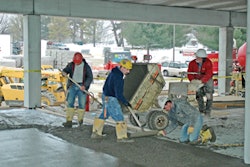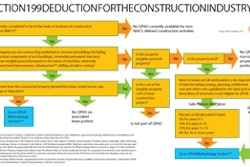In some areas, segments of the construction industry are showing signs of slowing up. While the words "slowing up" indicate less sales, it is not really as bad as it sounds. The backlog of new equipment, higher rental rates due to heavy demand and shortages (and thus higher costs) of basic commodities all indicate an overheated economic segment. In short, the industry is slowing up, but is still pretty darn good.
I just returned from the Associated Equipment Distributors' (AED) Summer Board Meeting and the comments above mirror those made by construction equipment dealerships around the country. Some were even suggesting that jobs were being cancelled because of increases in budgeted costs and lack of manpower. Residential seems to be taking the first hits; yet, despite slowing, it is still hovering near peak performance. Governmental projects, on the other hand, are being cancelled because of cost increases, or being cut back to meet the funding available.
Perform a status review
While some industry segments are slowing, others keep rolling along. Depending on where you fit in the scheme of things, you may or may not have to start thinking defensively. To at least get the ball rolling, however, you should:
- Make sure you have a decent set of financials. If you don't, hire someone to help you get them.
- Review your WIP and AR schedules. Are you billing all you can bill? Are you following up and collecting as you should be? It's easy to get sloppy when things are rolling along. It's also better to get current while your customers still can.
- Check the cash balance. Do you know the status of your cash balance? Do you know daily? Do you know what it will be at the end of the week? If not, you should.
- Follow up on past due payables. If you are starting to get calls about past due payables, it may be an indication you are falling behind.
After you do this review, determine what the signs are telling you. Are you still in your comfort zone, or is it time to make corrections? If it's time for corrections, do you know what to do?
Let's not overreact; what is being suggested is nothing more than prudent business practice. What do you think our banker friends are doing right now after the interest rate increases and publication of various work slowdowns in the industry? They are taking this same prudent look to see what and how they will have to change their approach to your business. Nothing new here— just a timing issue.
Ensure a good night's sleep
Even though you know you have to sell, produce and finance your business, as long as you have positive cash flow, you can sleep at night without wondering how you're going to make it to the end of the week. At the same time, you know you work in a cyclical industry and it will only be a matter of time before costs start creeping up to meet the revenue line.
The least you can do to avoid problems going forward include:
- Talk to your banker and see what is on his/her mind. If it sounds like they are starting to dislike the construction business, you may want to do some shopping.
- With interest rates starting to hurt, it may be time to review equipment obligations to see if you really need all the units you have on hand. The used equipment markets are still strong and you could maximize your proceeds from any sales you make. If business does slow, rental can take up the slack.
- Be wary about who you do business with, and stay away from questionable deals/promoters. Sometimes, taking a pass on certain business is more profitable than getting it.
- Review your income tax situation. After using the Bonus Depreciation incentives in prior years, your tax burden may be higher than you expect. Make sure you have you tax liability covered.
- Don't overextend your business finances. It takes money to make money. When you operate on a shoestring, minor changes cause big swings in cash flow and availability. Stay out of trouble.
- Sit down. Relax. Pick up a copy of your July or August financials and see what they are telling you. Compare them to last year. Are they better or worse? Can you continue to carry the fixed costs if business slows down? Is the business out there to sustain your current level of sales? Look at the interest expense line. Can you really afford to continue spending at the same pace?
No panic, and none intended. These are just prudent suggestions to put you— and keep you— at the top of your game.




















